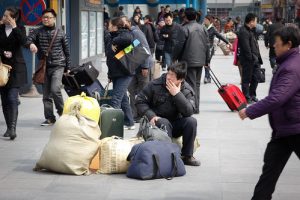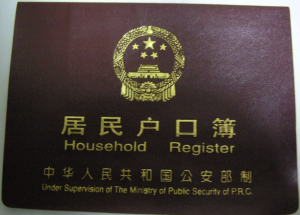
A migrant worker waiting for a train at the Shanghai Station.
Over time, China’s state and economic changes from feudalism to socialism and capitalism seem to have magnified not only the needy and poor condition of their rural citizens, but also the tension between their urban and rural citizens. The collapse of the Qing dynasty, effectively the end of Chinese feudalism, was followed with the socialist revolution and the urbanizing and growth of previously well-off areas. In the meanwhile, rural areas were left to support themselves, struggling and generally failing to recover and modernize as efficiently as their urban counterparts (Gaetano, 2015, 16-17). Later, China’s transition from a socialist to capitalist economy had swiftly reduced poverty rates but also exacerbated income inequality between the rural and urban Chinese, with the latter being more prosperous (Jiang, 2009, 18). Given the conditions within many less prosperous villages and several pressures upon peasants such as high agricultural taxes and “a large surplus labor force,” many of the rural Chinese have decided to leave behind agricultural work to migrate to urban areas, usually in search of better- paying work and a better life (Gaetano, 2015, 25). However, in search of work, many migrant workers have faced discrimination and unequal treatment relative to their long-settled urban counterparts, particularly through the hukou system and the lack of labor laws protecting migrants.
To start, the unequal treatment of rural Chinese migrant workers compared to urban workers was most simply seen in the implementation of the hukou (household registration system). The hukou, implemented during the Chinese socialist era, determined “the allocation of labor, goods, and services” among the rural and urban, specifically in that the urban Chinese would receive “a lifetime of employment and welfare” while the rural Chinese would have to continue providing for each other (Gaetano, 2015, 17). However, the system posed a problem for those transitioning from rural to urban life, as rural migrants could not register as urban citizens and receive their share of the social benefits. As seen in Spring Grass, for example, Spring Grass and her husband were forced to return back to their village to build their home because they were not legally allowed to do so in the city. With only themselves for support, migrant workers had to work more hours than a typical urban resident to be able to similarly sustain living in the city, easily placing the desperate migrant workers in a position to be exploited by employers and a greater capitalist system (China’s “industrial development model”) in need of cheap labor (Jiang, 2009, 23, 26-27). In addition, migrant workers were disincentivized to attempt coming to the city to compete for opportunities that were better than those offered from home, since the hukou system implemented rigorous restrictions that had to be followed in order for one to be permitted to migrate in the first place. Without support from the state through “subsidies and ration tickets” and given many migrants’ poor backgrounds, migrants could barely afford to even exist in the city, where they would be policed to report their residence (Gaetano, 2015, 17). Failing to abide by hukou-led restrictions would logically prevent an equally qualified candidate from being able to attempt to compete for a job in the city against an urban worker seeking the same position, highlighting another form of systemic oppression towards rural migrant workers. In essence, the hukou system contributed to simultaneously keep desperate migrant workers either overworked or out of the city.

A household’s hukou booklet, which was also kept as records by the local police.
Outside of difficulties brought about by the hukou system, migrant workers faced unequal treatment from within their jobs and through the pre-2000’s legal system as well. As prime examples, to elaborate on how employers took advantage of migrant workers’ desperation for work, employers would frequently either deny or delay wages to their migrant workers, in addition to failing to pay migrant workers at least at the minimum wage (Jiang, 2009, 23). Migrant workers facing such situations, who consisted of about 13% of the migrant worker population, would not receive legal protection because contracts were not drafted with their employers before their work started, due to either distrust or desperation towards their employers (Jiang, 2009, 24). Although it would seem both the employer and the employee are at fault for not creating a contract, the employee could possibly lose their job opportunity with the employer by proposing to write a contract if the employer had always intended to take advantage of the loopholes in the system that was supposed to protect the migrant worker in the first place. Given that the “regulation of labour law . . . failed to effectively protect rural migrants’ employment rights and interests” and that employment in the city was highly difficult for migrant workers to secure, the most desperate migrant workers could not control whether their employers would exploit their financial insecurity and the lack of migrant employment rights (Jiang, 2009, 23). The inability for rural migrant workers to be financially stable due to these circumstances is a stark contrast to the guarantee of financial security provided for those with an urban hukou status. Until the mid-2000’s, when the state began to address the migration of rural workers, this difference and exploitative system for hiring rural migrant workers endured for long (Gaetano, 2015, 20).
Two factors, the social and governmental attitude towards rural to urban migration for employment, seem to have contributed to the lack of actions taken on behalf of reforming migrant workers’ rights. As for the social attitude, many of the urban Chinese resorted to stereotyping and stigmatization towards the rural migrants. With the transition from revolutionary socialism to neoliberal capitalism, the inequality between the rural and urban Chinese was seen as the “result of each individual’s different ability to exercise rational choice and succeed (or fail) at accruing wealth and status” (Gaetano, 2015, 15). Although the rural Chinese did not seem to benefit from the hukou system like the urban Chinese did in the first place, the general attitude about widespread prosperity shifted from one of comradeship to disdain and ignorance about another’s circumstances within the social classes, leading to division between the rural and the urban. Although rural migrant workers might have various reasons for struggling to escape poverty, coming from a rural area became associated with a “social and moral taint” (Gaetano, 2015, 26). Consequently, an urban citizen would likely have lacked sympathy for the discrimination towards rural migrant workers, and without the support of urban workers as well, migrant workers would have struggled to fight for reform for equal employment rights. This social tension between the urban and rural Chinese seems to be reflected in Spring Grass’s relationship with her uncle and especially her aunt, as well. Although her uncle, who is from the village, tries to hospitable to her since they have family ties, Spring Grass’s relationship with her uncle is somewhat strained by the influence of her aunt, who is from the city. Although one might expect Spring Grass’s aunt to be more submissive to her husband based on gender roles, she is quite the opposite and influences much of her husband’s decision-making, which leans to be less generous to their two visitors. While not explicit, her influence was simultaneously reflective of the distaste of the urban towards their rural counterparts and the influence one with an urban hukou status had over those with a rural hukou status.
In regards to the government’s attitude towards migrant workers’ rights, more rational reasons for their inaction would have been expected. With the Chinese government’s interest in preventing mass upheavals and the rising social unrest from rural migrant workers towards the Chinese government, the grievances of the migrant workers and the discrimination they faced should have been of a greater concern to the Chinese government (Jiang, 2009, 19). However, the lack of action taken by local authorities and lawmakers to support equal rights and the upholding of migrant workers’ rights suggests otherwise about their position. With their assumptions, the Chinese government seemed to merely sweep the problem of the unequal treatment of migrant workers under the rug. One assumption was that the economy would improve and the migrant workers’ conditions would ameliorate themselves, which was faulty since other countries that had developed along the same model, the reverse U-model of income distribution, eventually failed to meet similar expectations. Another assumption was that migrants were happier financially then than ever before, but the issue with that claim was that it did not reflect the experiences of all migrant workers (Jiang, 2009, 26). Besides the need for cheap labor under the developing capitalist economy, the Chinese government did not seem to provide a clear front and a solid explanation for their reform for rural migrant workers’ rights before the 2000’s.
In conclusion, unequal treatment of rural migrant workers manifested through the conditions brought about by the hukou system and the Chinese legal system. Disdain towards the rural Chinese by the urban Chinese developed early on, and, along with the lack of action and interest of the government, contributed to keep reform of migrant workers’ rights stagnant for long. The entire situation appears to have been poorly addressed by the Chinese government, but beyond obvious ethical reasons, the country could have benefited from either such reform or focused investment in the countryside. By reforming the hukou system and/or investing in migrant workers’ work and education, perhaps the Chinese government could have mobilized such a large population of workers to stimulate a more productive economy much earlier, and counterproductive social attitudes towards the rural Chinese would have potentially shifted along earlier as well. Such investments could have manifested in forms such as increased funding for productive work training (either in the city or at home) or public education in rural areas. Ideally, these investments would relieve the need to migrate out of financial desperation and contribute overall to the social stability valued by the Chinese government.
Works Cited
Jiang, Wenran. “Prosperity at the Expense of Equality: Migrant Workers Are Falling Behind in Urban China’s Rise.” Confronting Discrimination and Inequality in China: Chinese and Canadian Perspectives, edited by Erroi P. Mendes and Sakunthala Srighanthan, University of Ottawa Press, Ottawa, 2009, pp. 16–29. JSTOR, www.jstor.org/stable/j.ctt1ckpdk1.7. Accessed 15 Mar. 2021.
“Rural Women and Migration under Market Socialism.” Out to Work: Migration, Gender, and the Changing Lives of Rural Women in Contemporary China, by Arianne M. Gaetano, University of Hawai’i Press, 2015, pp. 14–27. JSTOR, www.jstor.org/stable/j.ctt13x1k1r.5. Accessed 15 Mar. 2021.
